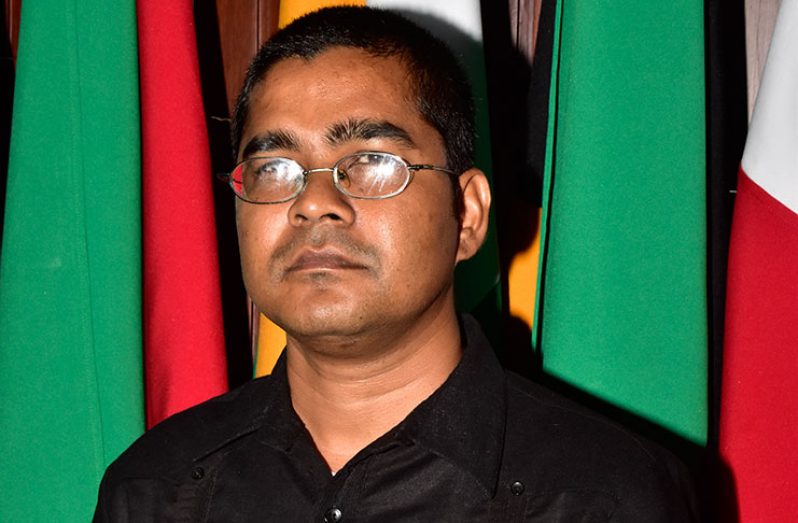…PPP-nominated commissioner wants Min. Lawrence sanctioned
…to submit minority report
COMMISSIONER of the Public Procurement Commission, Sukrishnalall Pasha, has objected to the findings of the report compiled by the body on the Georgetown Public Hospital Corporation’s (GPHC) $632M drug purchase and has reportedly prepared a minority report to be submitted to the National Assembly.
Prasha, in his 30-page long counter report, argued that the Public Health Minister Volda Lawrence was responsible for the multi-million dollar drug purchase which was done in breach of the procurement laws and should be sanctioned, sources who have seen the report told the Guyana Chronicle. Additionally, he noted that critical information was omitted from the substantive report compiled by the commission which would have impacted the findings.
“I don’t wish to speak on the issue. Whatever I did, it was supposed to be kept with some level of confidentiality,” Prasha told the Guyana Chronicle on Tuesday when asked about the matter. He insisted that the commissioners have sworn to secrecy. The PPC Chairperson, Carol Corbin, when contacted by the Guyana Chronicle, also declined to speak on the issue. “I have no comment,” Corbin repeatedly said. However, she explained that there is no room under the Laws of Guyana for a minority report to be submitted by the commissioners, stating clearly that all reports emanating out of the commission must be submitted to the National Assembly by the chair. She said when recess is over, and the National Assembly resumes, the report will be made available to the public.
On Monday, she had told this newspaper that the commission did not recommend sanctions against the errant public officials, noting that decision lies with the Government and those sitting at the helm of the GPHC. Findings have confirmed that the procurement laws were breached, given the fact that the GPHC sought approval from the National Procurement and Tender Administration Board (NPTAB) after it had started to receive drugs from suppliers.
Corbin had noted, however, that it was not the commission’s intention to recommend disciplinary action against those who had acted outside of the law. “That was not the purpose of the investigation,” she emphasised.
Based on the Terms of Reference (ToR), the investigation was executed to determine the circumstances under which the emergency drugs were procured. Additionally, it sought to determine whether the GPHC had acted in compliance with Procurement Act Chapter 73:05 in the procurement of emergency pharmaceuticals.
Another key aim of the investigation was to have greater understanding of the Public Health Minister Volda Lawrence’s involvement. Additionally, it was the intention of the PPC to provide a menu of measures that would allow the premier health institution to improve its procurement practices in keeping with the Procurement Act Chapter 73:05. It was in late March that the constitutional body launched an investigation into the purchase in keeping with its functions as detailed in Article 212 (AA) (1) of the Constitution.
Among those who had appeared before the commission was Public Health Minister Volda Lawrence, who argued that she was misled by the GPHC management, which was headed by Allan Johnson at the time.
Months after the Public Health Minister had appeared before the PPC, GPHC, in a statement in July, said that Minister Lawrence was not at fault. The hospital had conducted its own investigation under the watchful eyes of the Board of Directors headed by Attorney-at-Law Kesaundra Alves.
Findings from that investigation had found that while the ultimate decision to purchase, which constitutes a breach of standard operating procedures, was the minister’s, the then Chief Executive Officer (CEO) Allan Johnson should have known better.
The findings have revealed that after a drug shortage was reported at the medical facility, Minister Lawrence met with management and asked that a plan be devised to alleviate the situation.
Subsequently, a plan of action was developed and presented to the minister by the GPHC’s finance director. That plan of action included determining the availability of drugs from the Pan-American Health Organisation (PAHO), the Materials Management Unit (MMU), and local suppliers; obtaining quotations from suppliers; sending an evaluation report to the National Procurement and Tender Administration Board (NPTAB) for approval, followed by the award of tender.
What transpired, however, was that rather than follow the prescribed plan of action to the letter, the then CEO wrote the NPTAB seeking approval for the contracts after the corporation had begun receiving pharmaceuticals from the suppliers.
The suppliers at reference were ANSA McAL, from which was sourced $605M worth of pharmaceuticals; the New Guyana Pharmaceutical Corporation (GPC), from which was sourced another $20.8M worth; Health2000 $2.9M; and Chirosyn Discovery $2.1M.
Upon learning what had happened, the GPHC board, which conducted the inquiry, said while it was “shocked and disappointed” that the GPHC had breached the law, there was no information to suggest that the minister had given any instructions to bypass any procurement procedures or laws.
According to the board, senior staff of the Finance Department had an “ethical and professional” duty to properly advise the then CEO of what the standard procedure was, since the matter was within their realm of expertise.
“Johnson had been known to trust and depend on his officers to do the right thing, and it is regrettable that they failed him in this instance,” the board had said. However, the board did not exactly exonerate Johnson, stating that the power was within his judgment and signature, and that “he acted recklessly.” Johnson has since been relieved of his duties.




.jpg)









